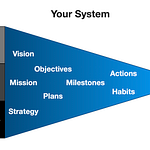
This is a draft of chapter 10 from the book I’m writing this year, Building the Invincible You. I’ve published previous chapters in my other newsletter, Invincible Career.
In the book, I share my strategies and methods for reclaiming your power in your work and life, your freedom to spend more of your time the way …













